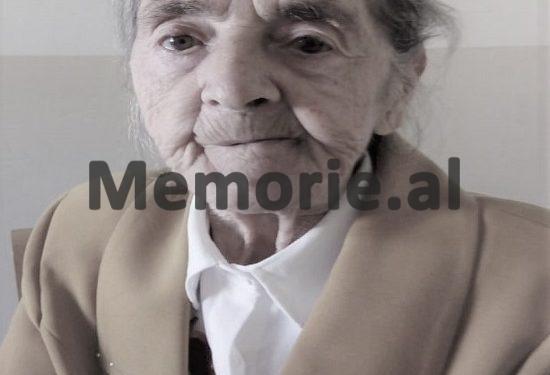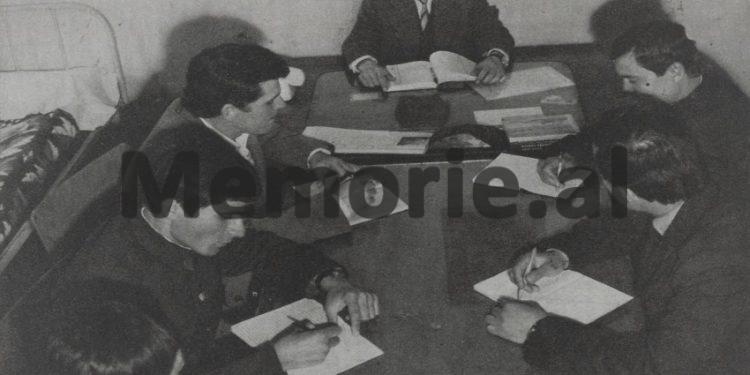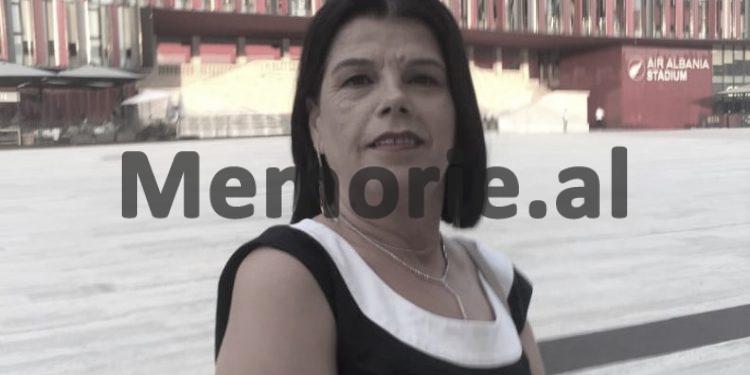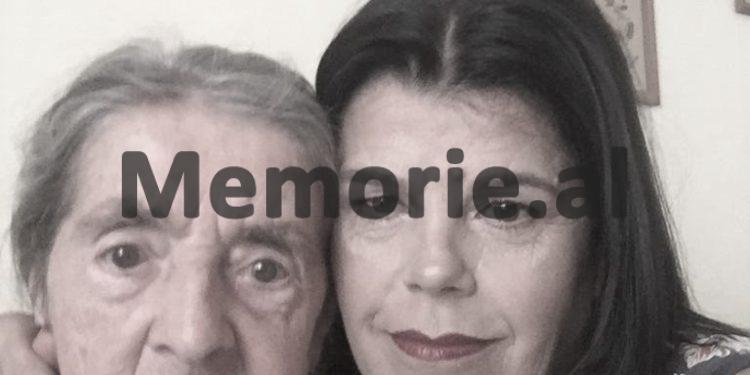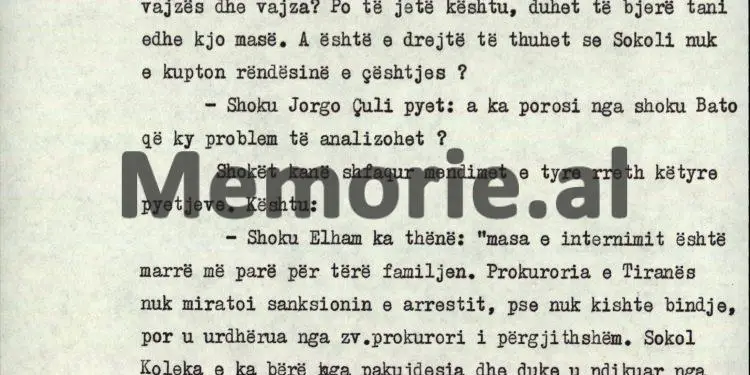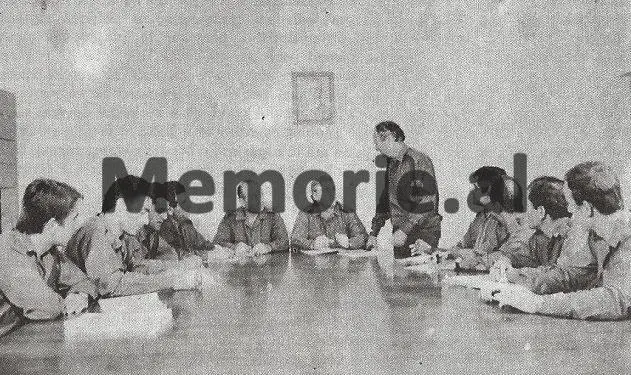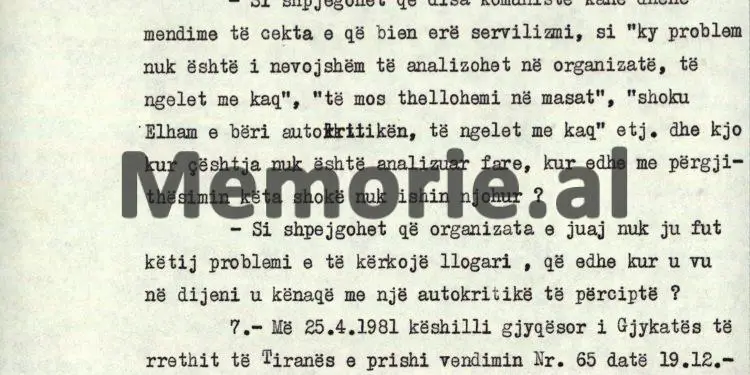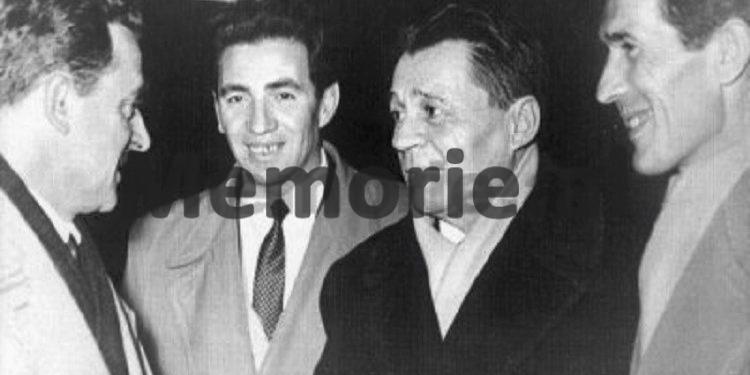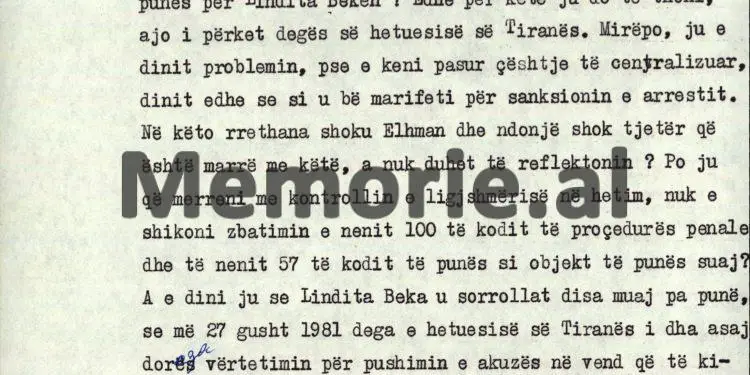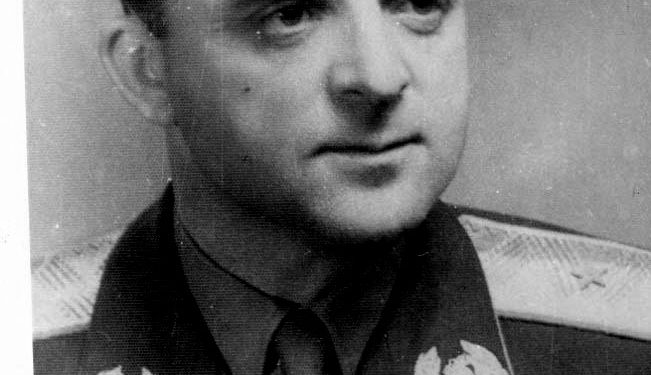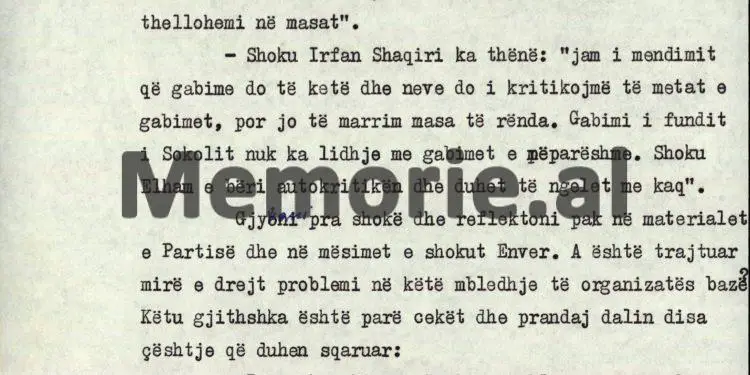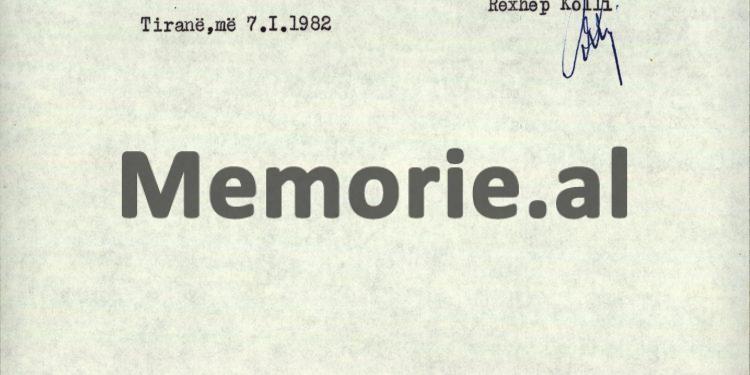Dashnor Kaloçi
The fourth part
Memorie.al/ publishes some archival documents extracted from the Central State Archive in Tirana (fund of the former Central Committee of the ALP), which are detached from a voluminous file with the initials “secret” which belongs to the years 1980-1982 and talks about the sensational event, the rupture of the tires of some of the vehicles of the foreign diplomatic corps, accredited in Tirana, where after the great concern of Enver Hoxha and his phone call to the Minister of Internal Affairs, Feçor Shehu, to whom, at the height of his anger, the “Commander” said: “If for 24 hours you do not find out who and why damaged the vehicles of foreign embassies in Tirana, find a hole and enter”! The alarm of the Minister of Interior, Feçor Shehu, who called for an urgent meeting, all the main directors of the department he headed, and after making clear to the “Commander” the great concern, lest that event would create a diplomatic incident with several countries, Within 24 hours, the State Security organs and other structures of the Ministry of Internal Affairs managed to discover the perpetrator of the “crime”, Prendushme Deda, an employee of the Municipal Enterprise of the capital, who was working on cleaning the streets, which was caught in flagrante delicto in front of the “Dajti” Hotel while packing the tires of some of the vehicles of the diplomatic corps in Tirana. Rare testimony of the former Director of the Central Forensic Laboratory of the Ministry of Internal Affairs, Neshat Tozaj, given shortly before he passed away, regarding the heated debates and his clash with Minister Feçor Shehu, after he, as the head of the laboratory he led, refused to sign the expert report, to consider the cutting tool as a “cold weapon”, with which the cleaning worker had broken the tires of some of the vehicles with “CD” license plates! Feçor Shehu’s threat to his subordinate who immediately fired him, sending him as a screenwriter to the Kinostudio “Shqipëria e Re” and Tozaj’s long odyssey, to restore his honor and dignity, sending him letters complaints to Prime Minister Mehmet Shehu and then Enver Hoxha. This became the cause and brought the cold and the first clash, between the two highest leaders of communist Albania, of that time! Enver’s accusations against Mehmet Shehu, why he had kept secret the sensational event that shook official Tirana (for fear of a diplomatic incident with several countries), where after his death and the arrest of Kadri Hazbi and Feçor Shehu , that new event came “on stage” and as a result, all members of the “hostile group”, who were accused of damaging the vehicles of foreign embassies and returning to the workplace of Neshat Tozaj, were released from prison and internment who a few years later, wrote the novel “Knives”, which at that time would make a big fuss!
Continued from the previous issue
The secret document with the report drafted by Rexhep Kolli, a senior official in the apparatus of the Central Committee of the ALP for the bodies of the Ministry of Internal Affairs, sent to his superiors, regarding the problem of the “hostile criminal group”, who were arrested and convicted of damaging vehicles of foreign embassies in Tirana!
Secret Dt.16.3.1982
Report
SOME ISSUES TO EXPLAIN AND CLARIFY IN THE BASIC ORGANIZATION OF THE INVESTIGATION DIRECTORATE PARTY
- The calm investigator who: “settled the case” and “found the evidence” to receive the sanction of arrest, sends comrade Sokol to the deputy district prosecutor, comrade Ilo Tasellari. However, Comrade Ilo, despite presenting you with the only act of Farudin and Kapllani, was not convinced that knives are cold weapons, so he refused to sanction his arrest.
This fact alarmed the comrades of the Directorate of Investigation. And always starting from the thought “we must arrest, because then we will dismantle during the process”, comrade Elham, calls the Deputy General Prosecutor, sends comrade Sokol Koleka there as well.
They complain to the General Prosecutor’s Office, why the district prosecutor did not give the sanction of arrest for Lindita Beka, that the case is sharp and of a political nature, etc., but they do not tell him that three other acts have been done for these knives, besides the act of Farudin Poçari and Kapllan Koka, that the two acts of the Central Forensic Laboratory do not call knives “cold weapons”.
Thus, the Deputy General Prosecutor ordered the district prosecutor to sanction the arrest of Lindita Beka on 30.X.1980. From this moment, the criminal file remained with only one act of expertise, that is, from the time the sanction of arrest was lifted, until it went to trial and the case was tried in April 1981, the file had only the act of expertise made by Farudin Poçari and Kapllan Koka. Other acts were hidden from the prosecutor and consequently the court.
The question arises and explanations are required for these problems:
- Why did Lindita have to be arrested for illegal possession of a weapon, an issue that could be pursued without arrest?
- Why were these tricks done against the law?!
- Whose bodies are the prosecution and the court and what does it mean to hide the truth from these bodies?
- Why was not ignored the Central Laboratory of Forensics, which according to the regulation approved by the Minister of Internal Affairs on 12.7.1974 “It is the only technical-scientific institution of forensic examination in RPSSH and is responsible in this field to all operational bodies of investigations of the MIA, Prosecution and Court bodies, state bodies, Party bodies and social organizations ”?
- Why was this regulation ignored, according to which those experts who do not work in the forensic sector cannot give expertise, because when expertise is the only evidence on the basis of which the person will be arrested, district experts cannot give acts expertise, but only the Central Forensic Laboratory
- Comrade Elham, Comrade Faredin, and others, told us that the regulation is for the internal affairs of the Laboratory, that it does not oblige the court investigator, why they have the right by law, to call any expert. Well then, why is this definition that we said above put in the regulation?
- This regulation, which is an order of the Minister of Internal Affairs, takes the place of normative bylaws, why do you not follow these normative acts?
Then our friends told us that they do not know this regulation, they do not have it, that it was made before the new Criminal Procedure Code came out and therefore it should be changed. Agreed, but is it normal for the Director of Investigation, the main person and staff in the ministry for laws, not to know the normative acts of the minister? If it had to be changed why not submit a timely proposal? As long as it has not changed, who gives you this right to violate it?
- On January 23, 1981, after three months of investigation, it was proven that there was no “diversionist group”. The Directorate of Investigation concluded that the 6 arrested defendants should go to court not together, but divided into three files. Specifically:
- The first file with three defendants:
- Prendushe Deda for actions that lead to provoking the breakdown of diplomatic relations, for agitation and propaganda, for possessing cold steel without permission.
- Gavrosh Lasku, for the crime of not reporting and for misappropriation of socialist property in the amount of 281.50 ALL.
- Lefkothe Lasku, for the crime of non-escalation and unauthorized failure.
- The second file with two defendants:
Edmond Ruzi for embezzlement of socialist wealth in the amount of 284.40 ALL and for the production and possession of knives in cold steel without permission.
– Lindita Beka, for the criminal offense of illegal possession of a knife, which is a cold weapon.
- Third file with a defendant:
– Marije Lasku, for criminal offenses of illegal failure.
So, at this very moment on 23.1.1981, when, as the people say “the cock turned into a hoof”, or “the impregnated mountain gave us a mouse”, the comrades of the Directorate of Investigation had to stop and analyze it deeply from all sides the process launched for the “diversionist group”, to look at the consequences that flowed from it, why did not they do that?
– How did the conscience not kill a little conscience Elham and other comrades, who based on the thought “to arrest, that during the investigation process we will dismantle it”, acted in violation of the law to obtain the sanction of arrest and are now taking him to court Lindita Beka to be unjustly punished ?!
– Why did not these comrades of the Investigation think that in order to get the sanction of arrest for Edmond Ruzin, they collected and did not collect the pieces of scrap metal, even those that were valued at 2 ALL, in order to exceed the amount over 200 ALL? Could not criminal politics be done with this boy, when it was known that in the family and in the family circle he had over 12 communists?
– Why did not these comrades, together with those of the operational sector, reflect that based on the thought: “we have a diversionist group”, families and persons have been unjustly interned?
– The process started for diversion and with a legitimate concern of all, to initially inform the leadership of the Party. Why now in January 1981 when the process was closed and it turned out as we said, was the Party leadership not informed?
In April 1981, the issue of removing the acts of expertise from the investigative file arose. Neshat Tozaj raised this in the basic organization, and then when he saw that he was not reacting, he reported the case to the General Prosecutor’s Office. The General Prosecutor’s Office and the High Court made a written intervention to the Minister of Internal Affairs and the latter on 20.4.1981, instructed the Directorate of Investigation to analyze this serious violation, to draw conclusions, to report the conclusion and to notify the General Prosecutor’s Office and the High Court in writing. The question rightly arises: what happened now? Here’s what happened:
At the meeting of the collegium of the Ministry on April 24, 1981, when it was analyzed: and Elham, who gave an easy answer to Sokol Kolekë, that: “it does not matter, one act is enough, knives are a cold weapon”. Comrade Elham in this meeting made a shallow self-criticism, blaming Sokol Kolekë more.
On April 29, 1981, when the party committee of the Ministry discussed “the report on some conclusions and problems that arise to implement a partisan and differentiated strike policy”, prepared by the First Directorate and that of the Investigation, this problem arose, but not in the report.
In his discussion, Comrade Elham said, among other things: I had to allow it with a standing answer.
When Sokol Koleka asked: “If all the acts of expertise performed for” knives “would be put in the investigative file, I answered without going into depth and quite carelessly:” It is clear that knives are cold weapons “one act is enough”.
Based on this response, Sokoli placed in the file an expert report where it was concluded that knives are cold weapons, while he keeps the other three acts with some other materials of the case, without passing them to the court “.
In this meeting of the committee, comrade Bato also criticized, who said that this violation should be analyzed in the organization, the causes should be revealed and Elhami should make self-criticism, as the basic organization of the Tirana Investigation branch should do. Even for the latter, Comrade Bato instructs Comrade Elham, to inform the secretary of the Party Committee of the Directorate of Tirana.
In this regard, some unclear issues arise that require explanations:
– Why was no problem analyzed now that the minister also gave an order? The order was given on April 20, 1981, so there was time and opportunity for such a thing to be done on April 24, 1981, when the collegium met, a little more on April 29, 1981, when the Party committee met. How do comrades Elham and Costa explain this? Why not include this issue in the report submitted to the Party committee?
– Until Comrade Bato gave an order to the Party committee to analyze the issue in the basic organization, why was this not done? Who is responsible for this?
– What was reported to the minister?
– Why was Comrade Vasil Kola not informed by Comrade Elham, about the opinion given by Baton to the Party Committee, that the organization of the Tirana Investigation Branch should also analyze this serious violation?
– Why in the college as well as in the Party committee, the problem went to you superficially, moreover, the blame was put on comrade Sokol Koleka. How this is explained, when it was known that the issue was centralized?
– On 12.5.1981, the Directorate of Investigation made a generalization “on a serious violation of socialist legality in the Investigation branch of the Directorate of Internal Affairs of Tirana”. This generalization is said only as much as Comrade Elham has discussed in the Party committee.
So even in this generalization, the blame and responsibility is given to Sokol Kolekë, that he, using the words of comrade Elham, said “quite carelessly and without deepening”, removed the acts from the file, that he has made unfounded investigations , why did not resolve the contradictions of experts with a wider group of experts, etc.
In the end, it is said that for this violation, the attention of comrades Sokol Koleka and Elhman Gjika was drawn, for a more careful and deeper work in the rigorous observance of socialist legality. So, the issue was given a spray of “rose water”.
From what Comrade Elham told us, this generalization was made by Costa Gazeli, the latter said: “I cannot do it, so we did it together with Comrade Elham”.
So here are some issues that needed to be clarified by you fellow communists:
How was the generalization made by the staff responsible for the breach?
Is it right to make a generalization for such a serious violation, that it became a problem in the central bodies of the Prosecution and the High Court, without analyzing the case in depth, without facing all the staff who were taken with this process ? How is it explained that even Sokol Koleka was not asked?
Is it fair that the same generalization, which was sent to the branches of Internal Affairs, be given to the General Prosecutor’s Office and the High Court?
When this generalization went to the Tirana Investigation Branch, Comrade Sokol Koleka said at the branch meeting: and in the end, everything I did I did by order of Comrade Elham, Comrade Farudin, Comrade Nystret, Comrade Koço, etc. ”
Comrade Sokol did not leave him like that, but complained to Comrade Nusret, where Vasil Kola was also present. Comrade Sokol came to Comrade Elham, he wanted to meet the Minister as well, but he was satisfied with the answers given by these comrades. Comrade Elham said to Sokol: “Go and do self-criticism, because I did too”. And comrade Faraudin, said: “Go to Sokoli now, because we all mischievous this work.”
Regarding these issues, some questions logically arise and clarifications are required:
- Are these partisan attitudes of Comrade Elham and Comrade Faraudin?
- Why didn’t Comrade Elham react even now and charge comrades, who had not invested in the matter, to thoroughly analyze the whole process?
Doesn’t this mean, comrade, an attempt to “not open the noodles to the cabbage”?
Where are the example and the spirit of education of the staff of the Directorate of Investigation towards the staff of the investigation sector down in the branch?
At this time when you had discussed and drawn conclusions about the orientations given by the Politburo in January 1981, how did you not reflect on this process and these violations of the law?! Memorie.al
The next issue follows




